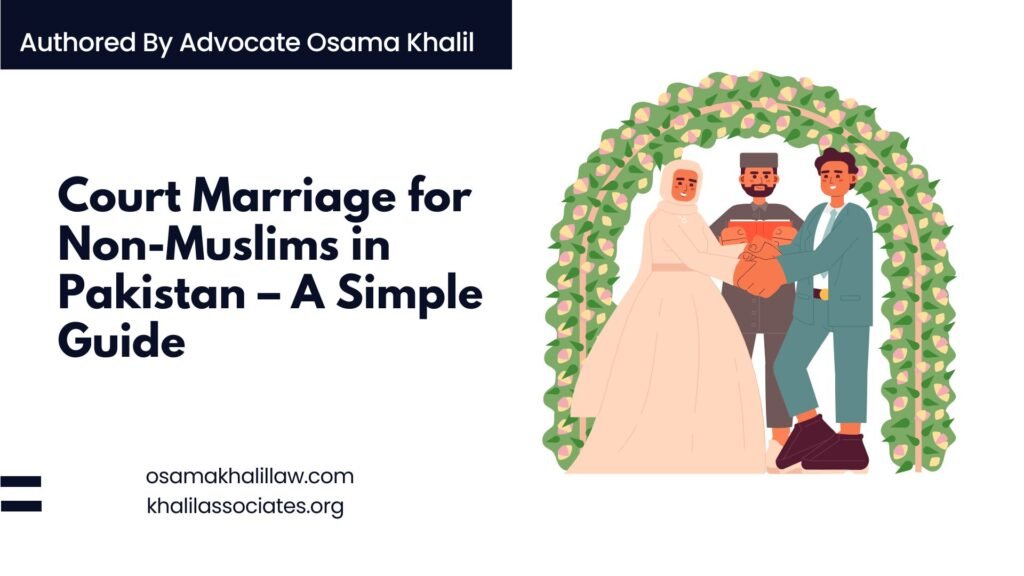
Court marriage for non-Muslims in Pakistan is a legal way for couples from minority communities to register their marriage under the law. Unlike traditional weddings, this process happens in court and follows specific rules.
Many people prefer non-Muslim marriage in Pakistan because it is simple, quick, and legally binding. Whether you are Christian, Hindu, Sikh, or from any other faith, you can choose civil marriage for minorities in Pakistan to make your union official.
Why Choose Court Marriage for Non-Muslims in Pakistan?
Couples opt for legal marriage for non-Muslims in Pakistan for several reasons. First, it avoids lengthy religious ceremonies. Second, it provides legal protection for both partners. Third, it makes things easier for interfaith court marriage in Pakistan.
Moreover, court marriage for non-Muslims ensures that your marriage certificate is valid everywhere, including for visa applications and property rights.
Legal Requirements for Court Marriage for Non-Muslims in Pakistan
Before proceeding with non-Muslim marriage in Pakistan, you must meet certain legal conditions.
Age Requirement
The groom must be at least 18 years old, and the bride must be at least 16. However, some provinces may have different rules, so always check local laws.
Consent of Both Parties
Both the man and woman must agree to the civil marriage for minorities in Pakistan without any pressure or force.
No Existing Marriage
Neither party should already be married. If previously married, they must provide divorce or death certificates of the former spouse.
Witnesses
You need at least two witnesses for legal marriage for non-Muslims in Pakistan. These witnesses must have valid CNICs (Computerized National Identity Cards).
Documents Needed for Court Marriage for Non-Muslims in Pakistan
To complete interfaith court marriage in Pakistan, you must submit the following documents:
CNIC Copies
Both partners must provide copies of their CNICs.
Passport-Sized Photographs
You will need recent photographs for the marriage certificate.
Affidavit of Free Will
This document states that both parties are marrying willingly.
Divorce or Death Certificate (If Applicable)
If either partner was married before, they must show proof of divorce or the death of the previous spouse.
Residential Proof
Some courts may ask for proof of address, such as utility bills or rental agreements.
Step-by-Step Process of Court Marriage for Non-Muslims in Pakistan
The process for court marriage for non-Muslims in Pakistan is straightforward if you follow these steps:
Step 1: Visit the Family Court
First, go to the nearest family court and ask for the non-Muslim marriage in Pakistan procedure.
Step 2: Submit the Application
Fill out the marriage application form and attach all required documents for civil marriage for minorities in Pakistan.
Step 3: Verification Process
The court will verify your documents and may call you for an interview to confirm your details.
Step 4: Marriage Notice
The court will display a public notice for a certain period (usually 14 days) to allow objections.
Step 5: Oath Taking
Both partners and witnesses must take an oath before the judge for legal marriage for non-Muslims in Pakistan.
Step 6: Marriage Certificate Issuance
Once everything is approved, the court will issue a marriage certificate, making your interfaith court marriage in Pakistan official.
Challenges in Court Marriage for Non-Muslims in Pakistan
While court marriage for non-Muslims is legal, some challenges may arise.
Family Pressure
Some families oppose non-Muslim marriage in Pakistan due to cultural or religious reasons.
Bureaucratic Delays
Sometimes, the process for civil marriage for minorities in Pakistan takes longer due to paperwork or court delays.
Legal Complications
If any documents are missing, the legal marriage for non-Muslims in Pakistan may get delayed.
Benefits of Court Marriage for Non-Muslims in Pakistan
Despite challenges, interfaith court marriage in Pakistan offers many benefits.
Legal Protection
A registered marriage ensures both partners have legal rights in case of disputes.
Simplified Visa Process
If one spouse is foreign, court marriage for non-Muslims in Pakistan makes visa applications easier.
Property and Inheritance Rights
A legal marriage certificate helps in claiming inheritance and property rights.
Frequently Asked Questions (FAQs)
Can Non-Muslims Have Court Marriage in Pakistan?
Yes, non-Muslim marriage in Pakistan is allowed under the law.
How Long Does Court Marriage Take in Pakistan?
The process for civil marriage for minorities in Pakistan usually takes 2-4 weeks.
Is Court Marriage Valid for Visa Purposes?
Yes, a legal marriage for non-Muslims in Pakistan is recognized internationally.
Can Interfaith Couples Get Court Marriage in Pakistan?
Yes, interfaith court marriage in Pakistan is possible if both partners are non-Muslim.
Conclusion
Court marriage for non-Muslims in Pakistan is a secure and legal way to register your marriage. Whether you are from the same faith or different, the process for non-Muslim marriage in Pakistan is simple if you follow the steps correctly.
By choosing civil marriage for minorities in Pakistan, you protect your rights and ensure legal recognition. If you face any issues, consult a lawyer to guide you through legal marriage for non-Muslims in Pakistan.
Remember, interfaith court marriage in Pakistan is your right, and the law supports you. Take the step today and secure your future with a legally registered marriage.
Legal Assistance
For professional legal guidance and support in immigration matters, you may contact:
Mr. Osama Khalil
Lawyer & Legal Consultant
📞 Phone: 0316-1829946
📧 Email: contact@osamakhalillaw.com | contact@khalilassociates.org
